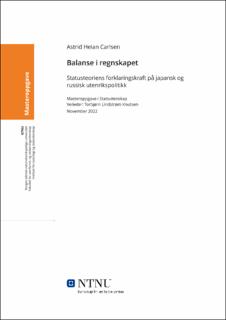| dc.contributor.advisor | Knutsen, Torbjørn Lindstrøm | |
| dc.contributor.author | Carlsen, Astrid Heian | |
| dc.date.accessioned | 2023-02-17T18:19:32Z | |
| dc.date.available | 2023-02-17T18:19:32Z | |
| dc.date.issued | 2022 | |
| dc.identifier | no.ntnu:inspera:123990411:64917235 | |
| dc.identifier.uri | https://hdl.handle.net/11250/3052139 | |
| dc.description.abstract | Denne avhandlingen tester statusteoriens forklaringskraft ved å stille følgende forskningsspørsmål: Hvordan kan statusteori bidra til å forklare Japans alenegang og ekspansjon i mellomkrigstiden, og i hvilken grad kan samme teori benyttes for å forstå Russlands invasjon av Ukraina? I Japans tilfelle benyttes tre fredsavtaler til å illustrere hvordan opplevelsen av rang-ubalanse bidro til japansk isolasjon og aggresjon mot Vesten. Muligheten til isolasjon fra Vesten er en av de tydeligste forskjellene når Russlands tilfelle skal vurderes. Dermed blir Russlands sammensatte geografi og tilhørende historie avgjørende i en forklaring som legger vekt på rang-ubalanse for å forklare invasjonen av Ukraina. | |
| dc.description.abstract | This thesis tests the explanatory power of status theory by asking the following research question: How can status theory help to explain Japan's solitude and expansion in the interwar period, and to what extent can the same theory be used to understand Russia's invasion of Ukraine? In Japan's case, three peace treaties are used to illustrate how the experience of rank imbalance contributed to Japanese isolation and aggression against the West. The possibility of isolation from the West is one of the clearest differences when it comes to assessing Russia's case. Thus, Russia's complex geography and associated history become crucial in an explanation that emphasizes rank imbalance to explain the invasion of Ukraine. | |
| dc.language | nob | |
| dc.publisher | NTNU | |
| dc.title | Balanse i regnskapet - Statusteoriens forklaringskraft på japansk og russisk utenrikspolitikk | |
| dc.type | Master thesis | |
